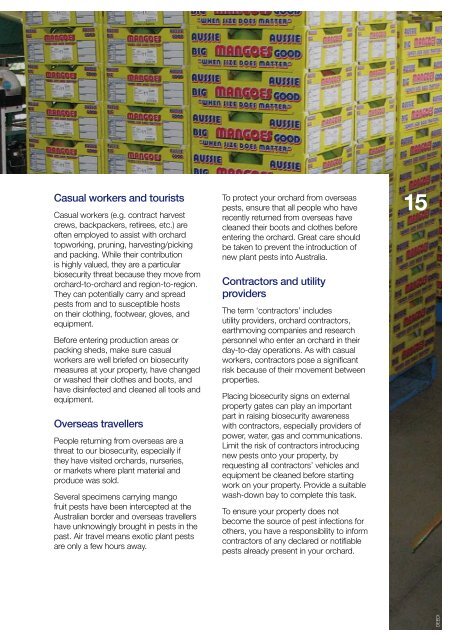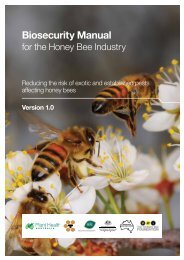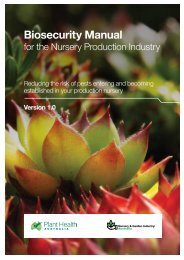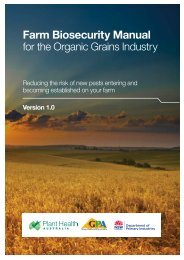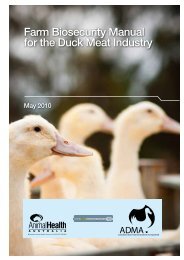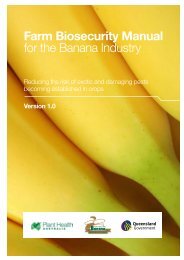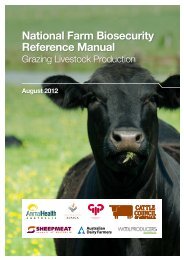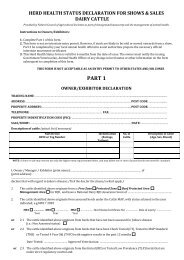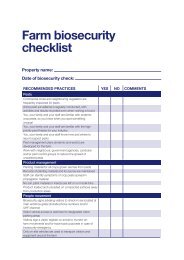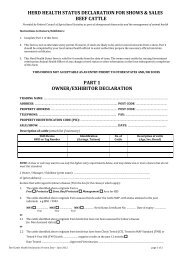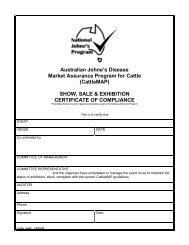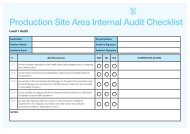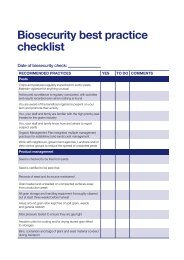Orchard Biosecurity Manual for the Mango Industry - Farm Biosecurity
Orchard Biosecurity Manual for the Mango Industry - Farm Biosecurity
Orchard Biosecurity Manual for the Mango Industry - Farm Biosecurity
Create successful ePaper yourself
Turn your PDF publications into a flip-book with our unique Google optimized e-Paper software.
Casual workers and tourists<br />
Casual workers (e.g. contract harvest<br />
crews, backpackers, retirees, etc.) are<br />
often employed to assist with orchard<br />
topworking, pruning, harvesting/picking<br />
and packing. While <strong>the</strong>ir contribution<br />
is highly valued, <strong>the</strong>y are a particular<br />
biosecurity threat because <strong>the</strong>y move from<br />
orchard-to-orchard and region-to-region.<br />
They can potentially carry and spread<br />
pests from and to susceptible hosts<br />
on <strong>the</strong>ir clothing, footwear, gloves, and<br />
equipment.<br />
Be<strong>for</strong>e entering production areas or<br />
packing sheds, make sure casual<br />
workers are well briefed on biosecurity<br />
measures at your property, have changed<br />
or washed <strong>the</strong>ir clo<strong>the</strong>s and boots, and<br />
have disinfected and cleaned all tools and<br />
equipment.<br />
Overseas travellers<br />
People returning from overseas are a<br />
threat to our biosecurity, especially if<br />
<strong>the</strong>y have visited orchards, nurseries,<br />
or markets where plant material and<br />
produce was sold.<br />
Several specimens carrying mango<br />
fruit pests have been intercepted at <strong>the</strong><br />
Australian border and overseas travellers<br />
have unknowingly brought in pests in <strong>the</strong><br />
past. Air travel means exotic plant pests<br />
are only a few hours away.<br />
To protect your orchard from overseas<br />
pests, ensure that all people who have<br />
recently returned from overseas have<br />
cleaned <strong>the</strong>ir boots and clo<strong>the</strong>s be<strong>for</strong>e<br />
entering <strong>the</strong> orchard. Great care should<br />
be taken to prevent <strong>the</strong> introduction of<br />
new plant pests into Australia.<br />
Contractors and utility<br />
providers<br />
The term ‘contractors’ includes<br />
utility providers, orchard contractors,<br />
earthmoving companies and research<br />
personnel who enter an orchard in <strong>the</strong>ir<br />
day-to-day operations. As with casual<br />
workers, contractors pose a significant<br />
risk because of <strong>the</strong>ir movement between<br />
properties.<br />
Placing biosecurity signs on external<br />
property gates can play an important<br />
part in raising biosecurity awareness<br />
with contractors, especially providers of<br />
power, water, gas and communications.<br />
Limit <strong>the</strong> risk of contractors introducing<br />
new pests onto your property, by<br />
requesting all contractors’ vehicles and<br />
equipment be cleaned be<strong>for</strong>e starting<br />
work on your property. Provide a suitable<br />
wash-down bay to complete this task.<br />
To ensure your property does not<br />
become <strong>the</strong> source of pest infections <strong>for</strong><br />
o<strong>the</strong>rs, you have a responsibility to in<strong>for</strong>m<br />
contractors of any declared or notifiable<br />
pests already present in your orchard.<br />
15<br />
DEEDI


